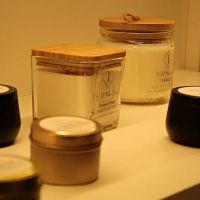Are Aromatherapy Candles Safe for People with Respiratory Problems?
- Introduction to Aromatherapy Candles and Respiratory Health
- Potential Risks of Aromatherapy Candles for Respiratory Issues
- Tips for Safe Use of Aromatherapy Candles for Those with Respiratory Conditions
- How to Choose the Right Aromatherapy Candles for Sensitive Respiratory Systems
- Real-Life Experiences: Aromatherapy Candles and Respiratory Health
- Conclusion and How to Make an Informed Choice
Aromatherapy candles have gained popularity for their ability to create a calming environment through the use of essential oils. While these candles can provide significant benefits for relaxation, the question arises: Are they safe for people with respiratory problems? In this article, we’ll explore how aromatherapy candles can affect respiratory health, the potential risks, and tips for safely using them to enjoy their benefits without compromising your well-being.
For individuals with respiratory issues, such as asthma, COPD, or allergies, it is essential to be aware of the potential risks that burning candles can pose. While aromatherapy candles are generally considered safe, certain factors can exacerbate respiratory conditions. Here’s how:
1. Smoke and Soot
Burning candles, especially those made from paraffin, can release smoke and soot into the air. These particles can irritate the lungs and worsen conditions like asthma or bronchitis. It’s important to avoid candles that produce a significant amount of soot or smoke.
2. Synthetic Fragrances
Aromatherapy candles that use synthetic fragrances may contain chemicals that can trigger allergic reactions or worsen respiratory problems. Some synthetic fragrances can release volatile organic compounds (VOCs) into the air, which are known to irritate the airways.
3. Essential Oils Sensitivity
While essential oils are natural, they can still pose a risk to sensitive individuals. Strong scents such as eucalyptus, peppermint, or cinnamon can irritate the respiratory system if used in high concentrations, particularly in enclosed spaces.
id="safe-usage-tips">Despite the potential risks, aromatherapy candles can still be enjoyed safely with proper precautions. Here are some essential tips for using aromatherapy candles in a way that minimizes the risks for those with respiratory conditions:
1. Choose Natural, Clean-Burning Candles
Opt for candles made from natural waxes like soy, beeswax, or coconut, as these burn cleaner and produce less soot than paraffin. Look for candles that use cotton or wooden wicks to reduce the release of smoke and toxins.
2. Avoid Strong Scents in Enclosed Spaces
If you have respiratory problems, it's best to avoid overpowering scents, especially in small, poorly ventilated rooms. Light the candle in a well-ventilated area and limit the burning time to avoid overwhelming your senses.
3. Use High-Quality Essential Oils
When choosing aromatherapy candles, make sure they contain pure, high-quality essential oils. Avoid candles with artificial additives or synthetic fragrances. If you’re uncertain about a particular scent, do a patch test by diffusing the oil in small amounts before lighting the candle.
Choosing the right aromatherapy candles is crucial for respiratory health. Here are a few tips on selecting safe and soothing options:
1. Look for Non-Toxic Labels
Choose candles labeled as "non-toxic," "natural," or "unscented" to ensure you’re using a product that won’t irritate your respiratory system. Many brands now offer candles specifically designed for sensitive individuals.
2. Avoid Paraffin and Synthetic Additives
Paraffin candles are made from petroleum byproducts and can release harmful chemicals when burned. Opt for candles made from plant-based waxes, which burn cleaner and are safer for indoor air quality.
3. Choose Mild, Calming Scents
When selecting aromatherapy candles, go for gentle, calming scents such as lavender, chamomile, or rose. These fragrances are less likely to cause irritation and are ideal for promoting relaxation without overstimulating the respiratory system.
Real-life experiences show that many people with respiratory issues can enjoy aromatherapy candles safely when they follow precautions. For instance, one individual with asthma found that using soy-based lavender candles in a well-ventilated space provided relaxation without triggering symptoms. On the other hand, a person with allergies found that eucalyptus-scented candles worsened their condition, highlighting the importance of choosing the right scents.
In conclusion, while aromatherapy candles can be beneficial for creating a calming and soothing atmosphere, it’s essential for individuals with respiratory problems to choose the right candles and use them safely. By selecting natural, clean-burning candles with mild, non-irritating scents, you can enjoy the benefits of aromatherapy without compromising your health. Always prioritize ventilation and avoid overpowering fragrances to protect your respiratory system.
If you’re looking for high-quality, safe aromatherapy candles, visit Scent Snob for a wide range of non-toxic, clean-burning options. Explore the collection and find the perfect candle to create a relaxing atmosphere without worrying about your respiratory health!



0 comments